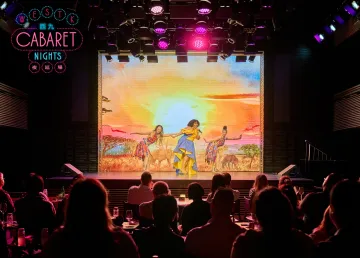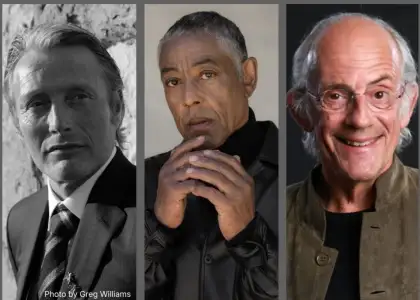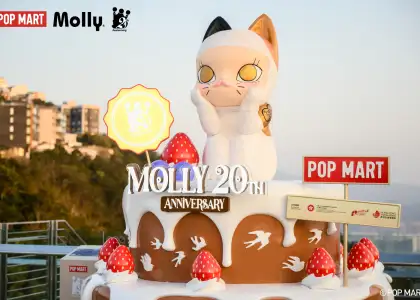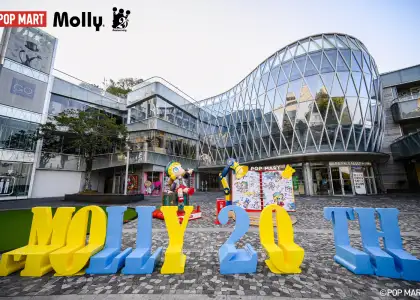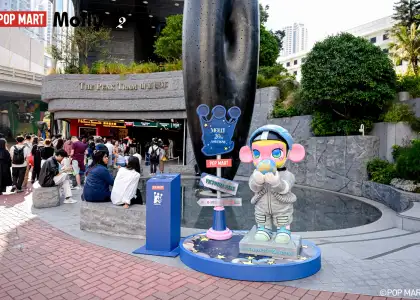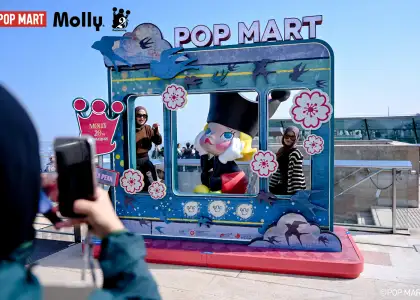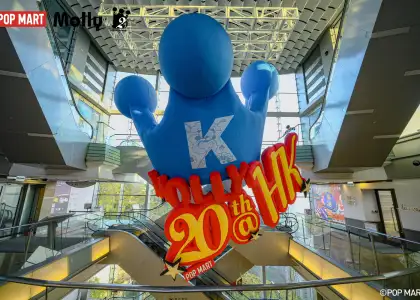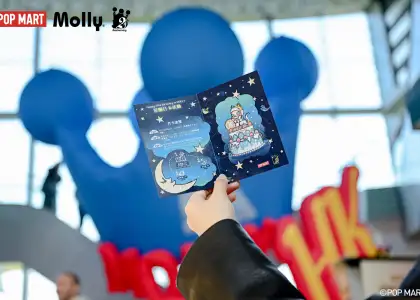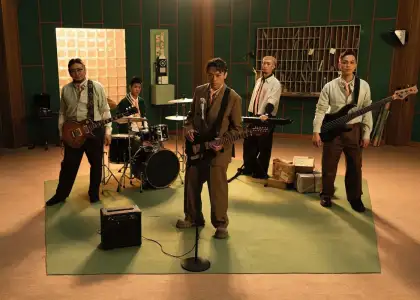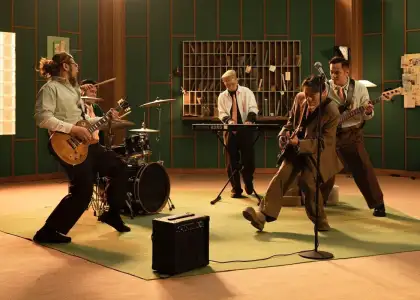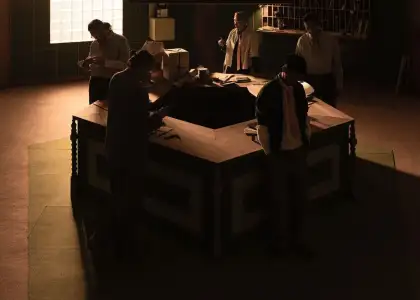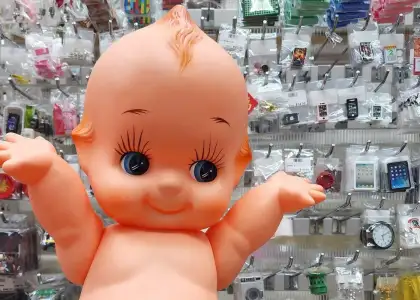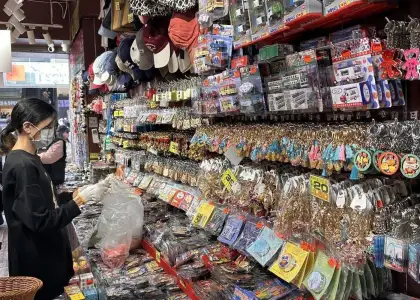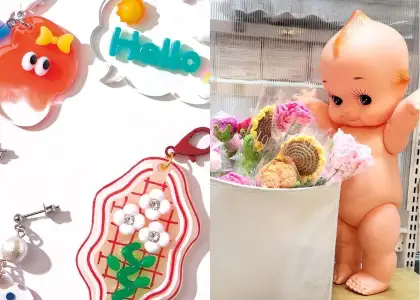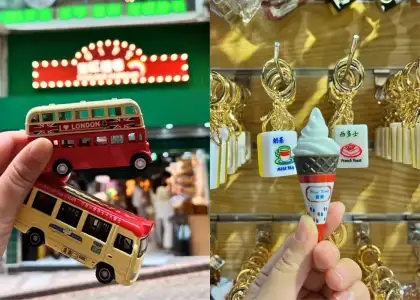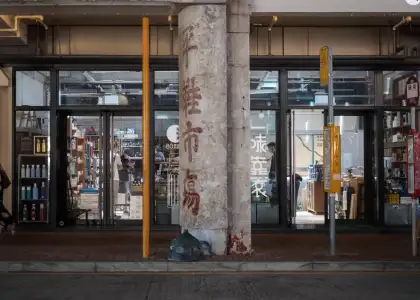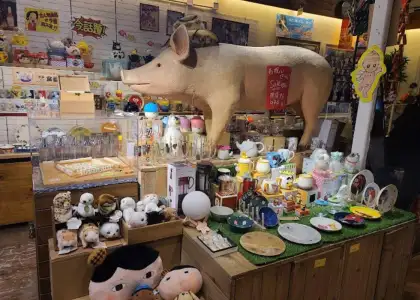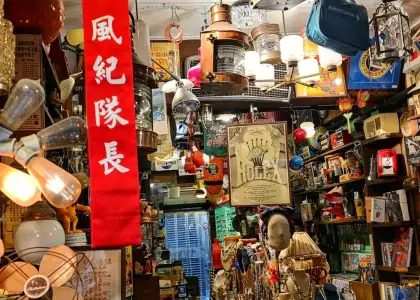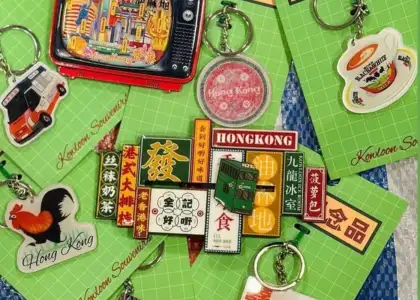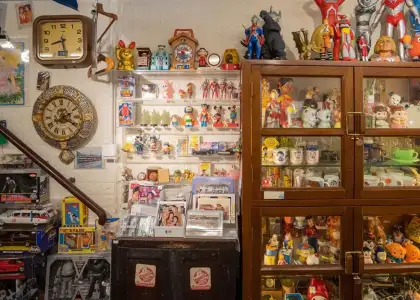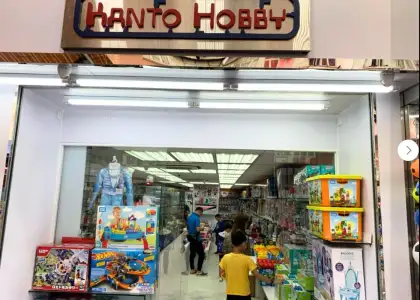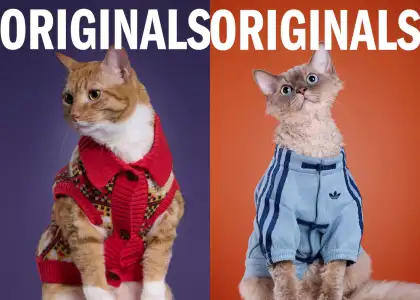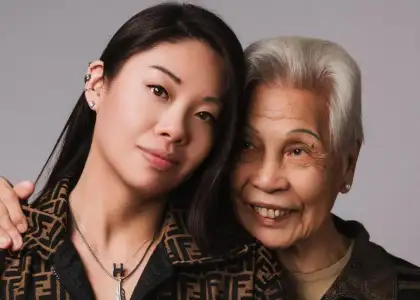In Tune With DJ Fabsabs: Reclaiming the Dance Floor with Cantomania

You may have observed the recent revival of Cantopop and Disco Nights happening across the city or trending on your feed, often hosted by local DJ collective and creative agency Cantomania. From coffee raves to family-friendly daytime discos like their takeover of Murray House in Stanley in partnership with Carnaby Fair, you'll often find DJ Fabsabs behind the decks hyping up the crowd with a flawless set delivering a seamless lineup of nonstop nostalgia.
The Beat Asia sat down with the DJ as he enthusiastically regaled his recent (global!) gigs, educated us to the depth and cultural richness of Cantonese music, and shared his secret to bringing the vibes to every party. As much as we loved Fabsabs' stories, we were also receiving a music education as he illuminated us on the history and intricacies of our Cantonese favorites.

DJ Fabsabs, also known as Pete Sabine, may have grown up as an expat in our international city, but he and his two brothers found their own ways to feel a sense of belonging in Hong Kong. “Cantopop was an avenue for me to try and connect more with local culture and to have less of like an expat identity,” Pete shares.
Pete grew his love for music into a career starting out as a radio DJ in university, then booking gigs in underground clubs. Cantonese music, though, was not something he imagined spinning in front of an audience of thousands. And little did Fabsabs know, he’d become one of the most visible champions of Cantonese music in Hong Kong’s nightlife scene, leading a movement that’s turning nostalgia into innovation.
Through his work at Cantomania, the genre-fluid party series he now runs, he’s remixing the city’s sonic heritage and building a space where language, identity, and sound collide.

But this isn’t just a story about a DJ finding his groove. It’s about cultural reclamation, about what it means to grow up in a place and choose to belong more deeply. Fabsabs didn’t inherit Cantonese music- he pursued it, learned the language partly through lyrics, and built a platform that celebrates both the classics and the lesser-known gems of Hong Kong’s musical past.
Tracing his journey from an outsider to a cultural curator, let’s explore the rise of Cantomania, and unpack how a genre once confined to karaoke rooms is now pulsing through dance floors across the city and beyond.

Cantomania itself, started as a modest party series founded in 2016 by DJ Jayme. A medical doctor by profession and a devoted figure in Hong Kong’s underground music scene, Jayme envisioned a space where Cantopop could be celebrated outside its usual contexts: not in karaoke lounges or concert halls, but on the dance floor.
Drawing from his eclectic DJ background and growing fluency in Cantonese, he began curating nights that blended nostalgia with experimentation. The parties gradually grew in scale and ambition, eventually landing gigs in venues like 宀, Quality Goods Club, and Soho House.
The turning point behind the success of Cantomania may have come during the pandemic, when audiences, starved for connection and craving cultural familiarity, flocked to their events and sets at local festivals like Clockenflap , Pop Fest, and M+ at Night. Social media moments, like a reel that hit over a million views, helped propel the brand beyond Hong Kong, bringing Fabsabs to London, Manchester, Macau, and Singapore.
But even as the project grows, its core remains the same: to celebrate Cantonese music in all its forms.
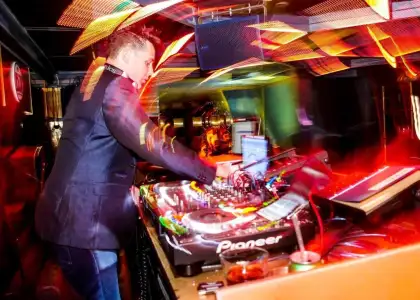
For Fabsabs, remixing is sometimes about reframing memory. His approach to Cantonese music is rooted in storytelling, where each edit becomes a way to reintroduce a song or a sound to a new audience, often in a new emotional context.
“Lyrics are so important in Cantopop,” he said. “The people who write lyrics in Cantonese are geniuses. If you think about lyricists like Wyman Wong, their writing is so emotionally involved and they’re referencing a lot of history, literature, and culture.”
That philosophy is especially evident in how he selects tracks. While Cantopop is often associated with slow ballads and karaoke staples, Fabsabs digs deeper, surfacing faster, lesser-known cuts from local artists that rarely get club play. These songs, often overlooked in mainstream settings, have become the backbone of his sets. By pairing them with ambient samples, vintage TV ads, and even MTR chimes, he creates a sonic collage that’s both nostalgic and forward-thinking.
But it’s the Cantonese lyrics that anchor everything. Their emotional density, poetic phrasing, and cultural specificity make them uniquely powerful on the dance floor, especially when recontextualized through basslines and synths.
How long have you been DJing for?
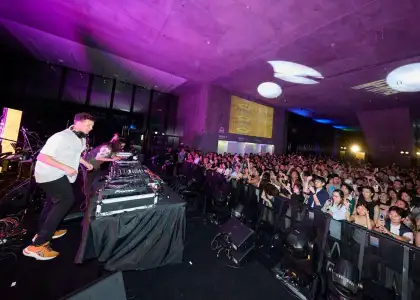
I’ve been DJing for over 20 years. I started during university in Edinburgh, doing late-night radio slots from 2 AM to 4 AM, which taught me how to collect and mix music, though it was on a radio console, not a club setup.
After graduating and returning to Hong Kong, a friend invited me to DJ at a bar (now Penicillin). I had no idea how to use the equipment, but I winged it, figured things out on the spot, and didn’t get fired, so that’s how my club DJ journey began!
When did you start DJing with Cantopop?
I actually started integrating Cantopop into my DJ sets around 2008 or 2009, mostly in bars and clubs, artists like Sammy Cheng were big then. But the first Cantomania event I played was in 2018 at 宀 in Sheung Wan.
In the early days, it was a niche event with small, dedicated crowds. Things really picked up during the pandemic, and by 2023, after playing Clockenflap and West Kowloon Pop Fest, it blew up. Now there’s huge interest, but I want to keep Cantomania special. not something that happens every day.
What makes a Cantonese track “dancefloor-worthy” in your eyes?
A strong beat and bassline are essential, but it’s also about energy and relatability. While Cantopop is often seen as slow or ballad-heavy, many artists have upbeat tracks that just aren’t widely known. I’ve spent time digging through albums to find those hidden gems.
Ultimately, it comes down to testing, seeing how people respond on the dancefloor. Some slower tracks can work too, depending on how you build the set’s tempo. If it’s not too serious and people can connect with it, it has dancefloor potential.
Cantomania started as a niche party and has grown into a movement. What do you think it tapped into culturally?

I think it resonated because people, especially during the pandemic, started reflecting on what Hong Kong meant to them, and Cantonese music became a way to reconnect with that identity. Everyone who speaks Cantonese knows the songs, so there’s a built-in emotional link. Social media played a huge role too. One reel from a show unexpectedly went viral, hitting a million views and adding thousands of followers in minutes. That moment made me realize how much interest there was.
Since then, we’ve built a team and streamlined operations. I think Cantomania tapped into a cultural need, especially among Gen Z, to celebrate local language, music, and identity in a fresh, communal way.
How do you balance nostalgia with surprise in your sets, especially when the crowd probably already knows the lyrics by heart?
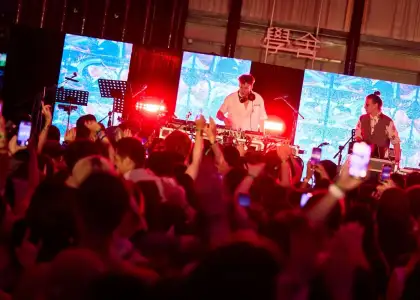
It’s a real challenge now that Canton Disco has matured, people know the hits, and repetition can get predictable. So I always keep the essentials but dig deeper into artist catalogs to find lesser-known tracks. I also incorporate non-musical elements like samples from Hong Kong TV ads, movies, and even ambient city sounds like the MTR, things that instantly evoke local culture.
Mashups help too, blending Cantopop with K-pop or Western tracks, but I’m careful not to dilute the Canto identity. The goal is to keep Hong Kong’s culture and language front and center while still surprising the crowd.
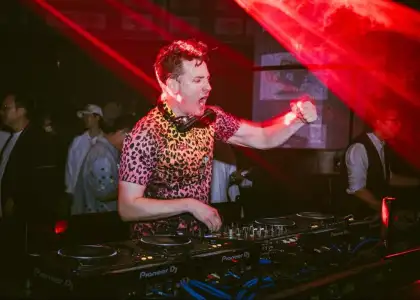
Fabsabs’ recent performance at Murray Summer also marked a symbolic moment. Held at one of Hong Kong’s most iconic colonial-era buildings, the event bridged past and present, turning a heritage site into a living venue for contemporary Cantonese culture. And these choices aren’t accidental. From venue selection to visual storytelling, Cantomania is designed to foster cultural pride and community.
It’s a place where older generations hear familiar melodies in new forms, and younger audiences discover the richness of a language they feel deeply. It’s also a space where diasporic Hongkongers, whether in London, Manchester, or Singapore, can reconnect with home through sound.
You recently participated in the “Murray Summer” takeover of Murray House in Stanley. Can you share a little more about the experience with us?

Murray House is such a recognizable landmark for anyone who grew up in Hong Kong, so doing an event there felt special.
For the night, I curated the DJs based on vibe, but I never tell them what to play. I want spontaneity, not rigid setlists. That freedom is what keeps the energy alive and the experience authentic. Visuals are central too, they help evoke the memories tied to the music.
Why are such initiatives essential for fostering culture and community in the city?
Events like Murray Summer show how underused spaces, like Murray House, can be transformed into vibrant community hubs. What made it special was that it was all-ages, which is rare in Hong Kong’s nightlife scene. Families could attend together, and that inspired me to think more about inclusive, family-friendly events. It’s important to create spaces where people of all backgrounds and ages can connect through music and culture.
For that event, my team at Neon Tiger handled everything, from the bar to the sound system, even though I’d just flown in from London that morning. It was exhausting but worth it. Collaborations like these, especially in historic venues, help bridge generations and keep Hong Kong’s cultural spirit alive.
Do you think Cantonese music carries emotional weight that’s different from English-language pop? If so, how?
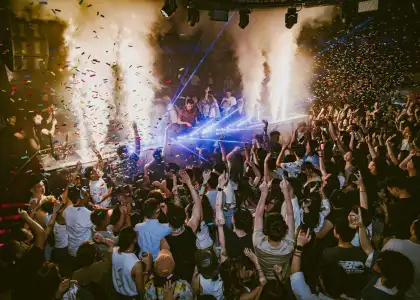
Absolutely. Cantonese lyrics often carry a depth and poetic quality that’s missing from much of today’s English-language pop.
While older English ballads had strong lyrical storytelling, modern chart music tends to focus more on surface-level themes. In contrast, Cantopop lyricists like Wyman Wong, their writing is so emotionally involved and they’re referencing a lot of history, literature, and culture. That richness creates a deeper connection for listeners. I also see this emotional depth emerging in Hong Kong’s hip-hop scene, where artists are writing with real substance.
Are there songs or lyrics that have stuck with you — ones that feel personal or poetic?
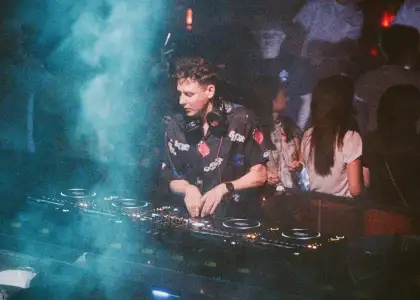
RubberBand - 未來見 (See You in the Future)
I played this song as the last of an M+ set to 4,000 people. That day I had just come back to Hong Kong from my grandmother's funeral, and I thought it was the perfect ending to the set, as a farewell, see you in the future to my grandparents who are now both passed.
陳奕迅 (Eason Chan) - 任我行 (Let me Roam)
Eason songs can be fairly indecipherable for Western audiences and out of all the songs this one stood out on the Fear and Dreams concert that I went to see in London. I was very kindly provided a ticket by Ben from Congee Sounds who I had played with at a Canton Disco event in Manchester. Me and a friend were talking about the end of this song, bringing in this tension between being free and following others: as a DJ I think this is really real, and it's relevant for everyone.
N.Y.P.D. - 美之 (Mee & Gee)
I just love this song because it references lots of stuff I grew up with. It's a really good example of newer bands writing fun songs without having to be so serious about the song structure or lyrics. And it's all kind of clever and post-modern but really fun.
Gordon Flanders - 全世界停電 第二年 (The Blackout, Year 2)
This is kind of a serious and depressing song in some ways, but I think it's quite a clever Wyman lyric, and it's a bit mental that you can hear this in a McDonald's, that wouldn't happen in English-first speaking countries. You probably would get something more upbeat.
LMF - 大懶堂 (Lazy Clan)
I think this song is something that always gets a great reaction because a lot of people hate their job and working is really stressful. LMF are definitely the type of artist 100% of people love at our shows.
What’s something you haven’t done yet musically that you’re itching to try?
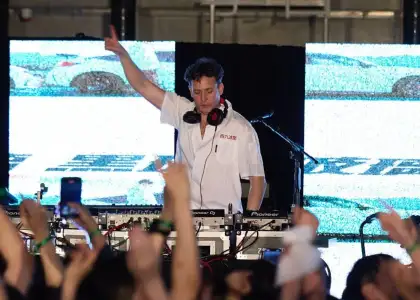
I’m really keen to explore more visual mediums, things like mini-drama formats or projects that weave in Hong Kong’s cultural elements. I’m also looking at expanding Cantomania into larger-scale festival-style events and more international touring. We’ve already played in London, Manchester, and France, and the response has been incredible.
Musically, I’m interested in remixing older Cantonese tracks using era-specific sounds, like Italo disco and analog textures, to preserve their original aesthetic. Remixing is tricky, you have to add something meaningful without losing the soul of the original. I’ve been reaching out to lesser-known artists from the ’80s and ’90s to collaborate on re-releases and edits that feel authentic to their time.
Beyond that, I want Cantomania to evolve into a full cultural movement, blending music with fashion, design, and visual storytelling. We’ve built a team that can handle everything from visuals to scripting, and we’re experimenting with new venues, including historic spaces like Murray House. I’m also passionate about supporting underground artists and producers, especially those who don’t fit into mainstream venues. A pop-up space could be a great way to give them a platform.
Ultimately, I want to keep pushing boundaries, supporting emerging talent, and creating experiences that go beyond just music.
This interview has been edited for length and clarity.
Catch DJ Fabsabs at his next shows and experience the magic of Cantomania at Maggie Choo’s on Sept 20, 2025, AIA Vitality Hub on Sept 26, and La Vache! on Sept 28. In case they're fully booked, follow the Instagram of DJ Fabsabs and Cantomania to make sure you don't miss their next ones!
Enjoyed this article? Check out our previous In Tune With profiles here.
Subscribe to The Beat's newsletter to receive compelling, curated content straight to your inbox! You can also create an account with us for free to start bookmarking articles for later reading.



